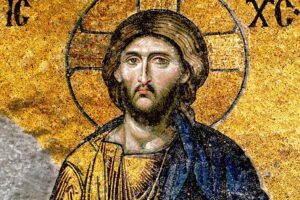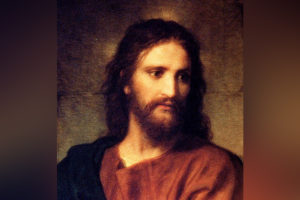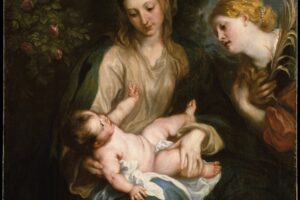The Bible’s Answer
Yes, Jesus Christ went to synagogue—which is the Old Testament equivalent of church—on a weekly basis. In the Gospel of St Luke, we read:
And [Jesus] came to Nazareth, where he had been brought up. And as was his custom, he went to the synagogue on the Sabbath day, and he stood up to read. 17 And the scroll of the prophet Isaiah was given to him. (Luke 4:16–17, ESVUK)
What we see here, is that it was Jesus’ “custom” to worship his heavenly Father by attending synagogue worship services every Sabbath day, and that they have Bible readings, just like church services today. The Jews at the time, as well as today, understood that an important aspect of the Third Commandment—remember the Sabbath to keep it holy (Ex 20:8–11)—included worshipping God in synagogue. This is because this is the perfect way to set apart God’s holy day of rest from the rest of the week, and is based on Israel’s congregational worship throughout the Old Testament (Deut 12:4–7; 1Chr 15:14–16; Ez 8:35; Neh 8:5–8). Since Jesus, a devout Jew, came not to do away with the law of God, but fulfil it (Mat 5:17), he also upheld the Third Commandment by going to synagogue every week.
There are many more instances throughout the Gospels, in which we see Jesus attending synagogue services. Jesus used many of these occasions to teach, as well as miraculously heal, fellow worshippers. Below are a few examples:
And Jesus went throughout all the cities and villages, teaching in their synagogues and proclaiming the gospel of the kingdom and healing every disease and every affliction. (Matthew 9:35)
And on the Sabbath [Jesus] began to teach in the synagogue, and many who heard him were astonished, saying, “Where did this man get these things? What is the wisdom given to him? How are such mighty works done by his hands? (Mark 6:2)
The high priest then questioned Jesus about his disciples and his teaching. 20 Jesus answered him, “I have spoken openly to the world. I have always taught in synagogues and in the temple, where all Jews come together. I have said nothing in secret. (John 18:19–20)
And the people sought [Jesus] and came to him, and would have kept him from leaving them, 43 but he said to them, “I must preach the good news of the kingdom of God to the other towns as well; for I was sent for this purpose.” 44 And he was preaching in the synagogues of Judea. (Luke 4:42–44)
Again he entered the synagogue, and a man was there with a withered hand. 2 And they watched Jesus, to see whether he would heal him on the Sabbath, so that they might accuse him. 3 And he said to the man with the withered hand, “Come here.” 4 And he said to them, “Is it lawful on the Sabbath to do good or to do harm, to save life or to kill?” But they were silent. 5 And he looked round at them with anger, grieved at their hardness of heart, and said to the man, “Stretch out your hand.” He stretched it out, and his hand was restored. (Mark 3:1–5)
Jesus did not use his constant travels as an excuse to stop attending synagogue, but faithfully attended every week, wherever he went. In fact, Jesus was a rabbi in his earthly ministry (Jn 1:38; 3:2; 6:25; 9:2), and rabbis are Jewish teachers who preach on the Old Testament in synagogues—just like Christian pastors and priests today, who preach on both the Old and New Testament in churches (1Tim 3:2–3; 2Tim 4:1–2).
Jesus Gave Instructions Regarding Public Worship
In addition to attending synagogue, Jesus also gave commandments concerning the public worship life of Israel, as well as the Christian church. In one account, Jesus told a leper whom he had cleansed to uphold Moses’ commandments on Israelite temple worship, by telling him to present the priest with the required offering:
While he was in one of the cities, there came a man full of leprosy. And when he saw Jesus, he fell on his face and begged him, “Lord, if you will, you can make me clean.” 13 And Jesus stretched out his hand and touched him, saying, “I will; be clean.” And immediately the leprosy left him. 14 And he charged him to tell no one, but “go and show yourself to the priest, and make an offering for your cleansing, as Moses commanded, for a proof to them.” (Luke 5:12–14)
This shows that Jesus supported Israel’s public worship services, before the church was fully established after his resurrection. In another account, Jesus gave his disciples instructions on how disputes are to be resolved in the public life of the Christian church—which means that even during Jesus’ earthly ministry, the church as an institution was being formed by him, and becoming distinct from the synagogue:
“If your brother sins against you, go and tell him his fault, between you and him alone. If he listens to you, you have gained your brother. 16 But if he does not listen, take one or two others along with you, that every charge may be established by the evidence of two or three witnesses. 17 If he refuses to listen to them, tell it to the church. And if he refuses to listen even to the church, let him be to you as a Gentile and a tax collector. (Matthew 18:15–17)
We see in the Apostle Paul’s epistles to Timothy and Titus, which he wrote near the end of his life, that by then the church’s structure and hierarchy were fully developed. For instance, we see the leadership positions in the church fully outlined, as well as the qualifications for them (1Tim 3:1–13; Ti 1:5–9), a church program for caring for widows (1Tim 5:3–16), instructions on a pastor’s income (1Tim 5:17–18), church discipline (1Tim 5:19–20), proper behaviour in the church (Ti 2:1–10), and the process of ordaining pastors by apostolic succession (1Tim 4:14; 5:22), etc.
If Jesus Went to Synagogue, Why Do Christians Go to Church?
Already during Jesus’ ministry, relationships were tense between the Jews who rejected Jesus, and the Jews who believed in him (Jn 7:40–44), who would later be called Christians (Ac 11:26). In fact, towards the end of Jesus’ ministry, the religious Jewish leaders had agreed that any Jew who confessed Jesus as the Christ was to be excommunicated from the synagogue—the worship life of Judaism (Jn 9:22).
After the Jewish leaders had Jesus martyred by crucifixion (Jn 19:14–16), they became so hostile towards Christ’s followers, that the apostles hid from them for a time (Jn 20:19). However, after Jesus rose again from the dead, he appeared to the apostles (as well as other disciples) to strengthen them, commission them to make disciples of all nations (Lk 24:45–49; Mat 28:19–20), and to tell them to wait for the promise of the Holy Spirit, who empowered them to do so (Ac 1:4–7) on the Feast of Pentecost (Ac 2:1–4).
Because the religious Jewish authorities were excommunicating Christians, putting them in prison (Ac 5:17–18), and even martyring some (Ac 6:59–60), Christians could no longer continue to worship in synagogues. Instead, they had to form their own worship communities in houses, where they could safely worship Christ without persecution (Mat 28:9, 16–17; Lk 24:51–52), who is, in fact, the God of Israel (Jn 1:1, 14; 8:58; 10:30; 20:28). These came to be called churches (Ac 14:23; 20:17), the name Christ had given the worship community of his followers during his ministry (Mat 16:18; 18:15–17). We see the public worship life of the church really take off just after the Holy Spirit, with the Lord Jesus, converted 3,000 souls to Christianity by Peter’s preaching, on the day of Pentecost:
And they devoted themselves to the apostles’ teaching and the fellowship, to the breaking of bread and the prayers. 43 And awe came upon every soul, and many wonders and signs were being done through the apostles. 44 And all who believed were together and had all things in common. 45 And they were selling their possessions and belongings and distributing the proceeds to all, as any had need. 46 And day by day, attending the temple together and breaking bread in their homes, they received their food with glad and generous hearts, 47 praising God and having favour with all the people. And the Lord added to their number day by day those who were being saved. (Acts 2:42–47)
The act of “breaking bread in their homes” refers to celebrating the sacrament of Holy Communion (1Cor 10:16–17)—which every Christian church still does in worship services to this day—which Jesus instituted on the night when he was betrayed, and told his followers to do likewise in remembrance of him (Mat 26:26–29; 1Cor 11:23–26). As we can see, the first Christians did this every day at first, not just every Sabbath (Saturday). However, as time went on, the regular day for Christians to assemble to celebrate the liturgy of Holy Communion became Sunday (the first day of the week):
On the first day of the week, when we were gathered together to break bread, Paul talked with them, intending to depart on the next day, and he prolonged his speech until midnight. (Acts 20:7)
Christians chose to worship at church every Sunday, rather than Saturday, to distinguish themselves from the Jews who remained in the synagogue, and in order to honour the Lord Jesus, because Sunday was the day on which he rose again from the dead (Jn 20:1, 15–18; Mat 28:1, 9–10). Since Christ had fulfilled the Old Testament Sabbath after his death, resurrection, and ascension, this gave the church the right to decide on a different day of public worship (Col 2:16–17). The New Testament Sabbath is, in essence, the rest that we have from our salvation in Jesus Christ (Heb 4:8–11), and by extension of the Third Commandment, it is any day of the week that Christians choose to set aside to worship God, and honour the Word of God, by hearing it publicly read (1Tim 4:13).
Practical Application
The Lord Jesus Christ set a standard to follow, for all those who take his name upon themselves. Jesus said, “If anyone would come after me, let him deny himself and take up his cross and follow me” (Mat 16:24). St Paul said, “Be imitators of me, as I am of Christ” (1Cor 11:1), and St Peter said, “For to this you have been called, because Christ also suffered for you, leaving you an example, so that you might follow in his steps” (1Pet 2:21).
The Bible says that God’s blessings come upon those who obey his commandments and will, but his curses come upon those who choose not to (Deut 11:26–28; 30:15–20). Paul, the rest of the apostles, and all the early Christians imitated Christ—who followed God’s will perfectly in his earthly life (Jn 8:29)—and followed his example by going to church every Sunday. Therefore, Christians today should also follow Christ’s example by going to church each week, if they truly love Jesus (Jn 14:15).
To learn how to have your sins forgiven, and spend eternity with Jesus Christ, please read the following article.
See Also






